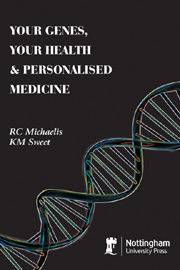Book contents
- Frontmatter
- Contents
- INTRODUCTION
- 1 UNDERSTANDING THE MEANS BY WHICH OUR GENES INFLUENCE OUR HEALTH
- 2 THE MECHANISM WHEREBY A GENE MAKES ITS PROTEIN
- 3 UNDERSTANDING THE PRINCIPLES OF INHERITANCE
- 4 USING YOUR FAMILY HISTORY INFORMATION TO PREDICT YOUR RISK FOR SPECIFIC DISEASES
- 5 USING GENETIC TESTING TO MAINTAIN YOUR HEALTH AND PERSONALISE YOUR MEDICAL CARE, NOW AND IN THE FUTURE
- 6 MAKING THE DECISION WHETHER OR NOT TO HAVE GENETIC TESTING, AND INTERPRETING THE RESULTS OF TESTS YOU CHOOSE TO HAVE PERFORMED
- 7 NUTRIGENOMICS AND EPIGENETICS: THE EFFECTS OUR DIET, ENVIRONMENT AND LIFESTYLE HAVE ON OUR GENES AND PROTEINS
- EPILOGUE AND USEFUL INTERNET RESOURCES
- INDEX
EPILOGUE AND USEFUL INTERNET RESOURCES
- Frontmatter
- Contents
- INTRODUCTION
- 1 UNDERSTANDING THE MEANS BY WHICH OUR GENES INFLUENCE OUR HEALTH
- 2 THE MECHANISM WHEREBY A GENE MAKES ITS PROTEIN
- 3 UNDERSTANDING THE PRINCIPLES OF INHERITANCE
- 4 USING YOUR FAMILY HISTORY INFORMATION TO PREDICT YOUR RISK FOR SPECIFIC DISEASES
- 5 USING GENETIC TESTING TO MAINTAIN YOUR HEALTH AND PERSONALISE YOUR MEDICAL CARE, NOW AND IN THE FUTURE
- 6 MAKING THE DECISION WHETHER OR NOT TO HAVE GENETIC TESTING, AND INTERPRETING THE RESULTS OF TESTS YOU CHOOSE TO HAVE PERFORMED
- 7 NUTRIGENOMICS AND EPIGENETICS: THE EFFECTS OUR DIET, ENVIRONMENT AND LIFESTYLE HAVE ON OUR GENES AND PROTEINS
- EPILOGUE AND USEFUL INTERNET RESOURCES
- INDEX
Summary
We hope this book has enabled you to better understand how your genetic and non-genetic factors influence your health. We hope you now see that family history is an important tool to help you and your healthcare team better understand your risk for certain diseases and design a health management plan that is best for you based on this information. We also hope you have learned that personalized medicine sees each person's body as an integrated ecosystem, with the different elements of the ecosystem (genetic, dietary, environmental, lifestyle, experience) influencing each other, and mechanisms in place to keep the different aspects of the ecosystem in balance with each other. In addition, the best personalized medicine tests will need to take into account the fact that the degree to which genetic factors and nongenetic factors influence your risk for a specific disease may change over the course of your life. Indeed, there are many challenges ahead, and it will require a lot of time and research to truly bring out the full potential of personalized medicine. It is also true, however, that the new technologies have enabled researchers to gather unprecedented amounts of data, and it is just a matter of time before we know how to use this information to improve health care for everyone.
We also think you can predict the way in which the field of personalized medicine will expand by looking at the evolution of computer technology. Not only will the development of the field of personalized medicine resemble the development of the computer technology field, the developments that have occurred in the computer technology field are an important part of what is enabling the field of personalized medicine to evolve as it is evolving. The advances in computer chip technology have enabled the field of computer technology to advance to where we can hold computers in our hand that are more powerful than computers that used to take up an entire room. Applying computer chip technology to genetic analyses has enabled the development of microarray-based assays that provide researchers with overwhelming amounts of data in a single experiment. In addition, the advances in DNA sequence analysis programs are enabling researchers to make sense out of these massive bodies of information much more quickly than was ever possible.
- Type
- Chapter
- Information
- Your Genes, Your Health and Personalised Medicine , pp. 151 - 154Publisher: Nottingham University PressPrint publication year: 2011



